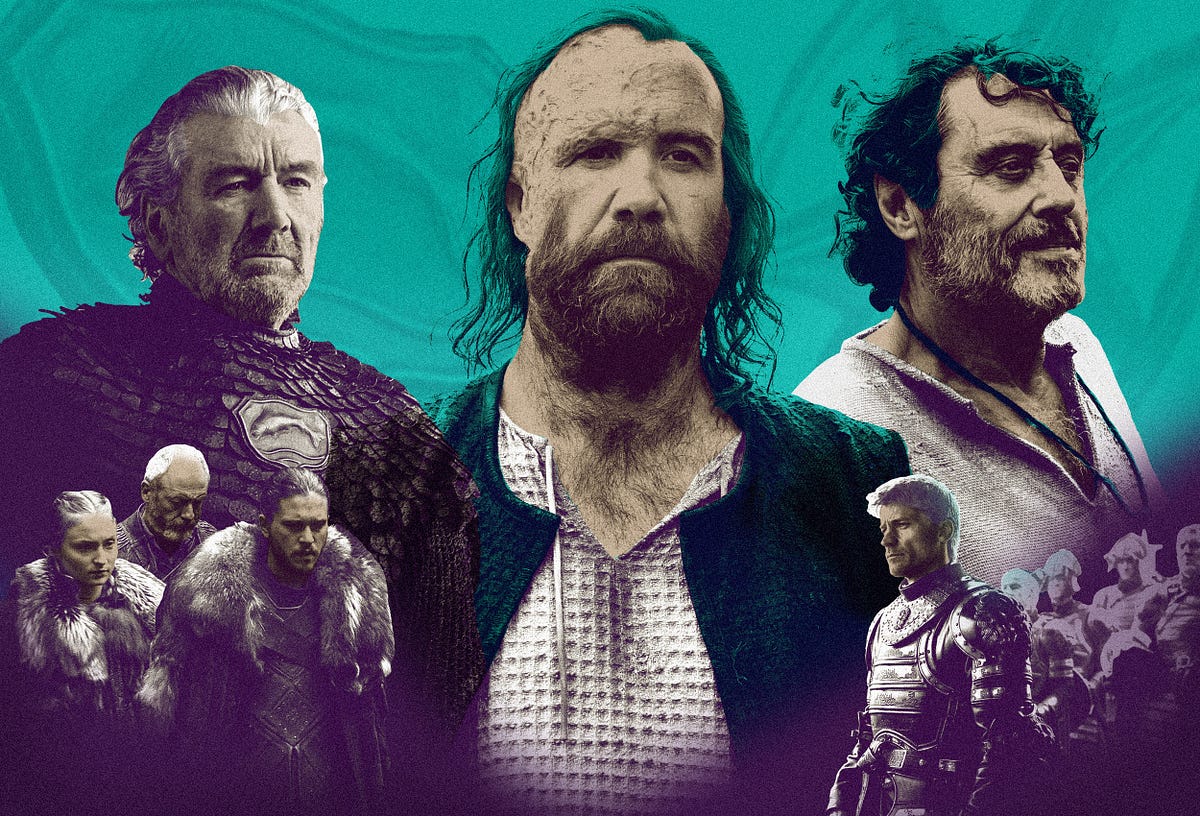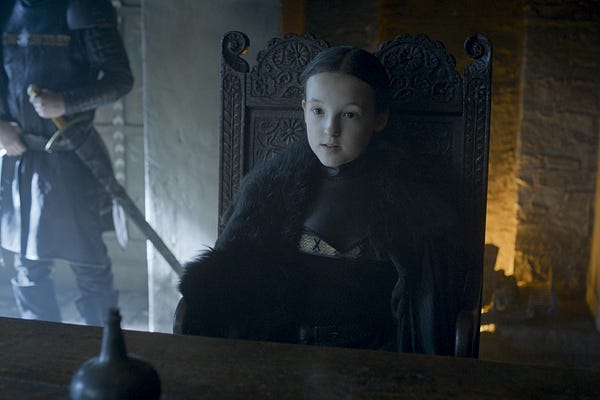https://theringer.com/ask-the-maester-the-high-sparrow-cleganebowl-837ce46e2de1#.w89zgqw7n
The High Sparrow’s Long-Term Plan, the Canceled Cleganebowl, and the Future of the North
By Jason Concepcion
Staff Writer, The Ringer
Episode 8, “No One,” is the calm before
Game of Thrones’ traditional Episode 9 storm. By abolishing trial by combat, King Tommen has unwittingly dashed our hopes for
the Cleganebowl. That leaves us only
the Bastard Bowl to look forward to. Get hype.
On to the questions.
John asks, “Do we know what the ‘rumor’ that Cersei was told about is? Has that been mentioned in the past?”
After Bran’s visions of wildfire exploding in “Blood of My Blood,”
I wrote about the Mad King’s secret doomsday plot to level King’s Landing using the viscous green explosive. (Long story short, Jaime Lannister killed the Mad King and his Hand, Rossart, before the caches could be detonated and, in the days after the fall of the city, hunted down the remaining plotters.)
Though some of the wildfire caches were discovered and used for the Battle of the Blackwater, I suspect Qyburn located whatever remains for Cersei, who plans to use it as her last-ditch, get-out-of-trial-free card. This corresponds to
the “Mad Queen” theory, which is less a theory and more an accurate reading of Cersei’s character.
Julian asks, “Is the High Sparrow playing the long con? By convincing King Tommen to ban trial by combat, he ensures that Cersei will lose. If she loses, it proves that she committed incest and thus Tommen has no rightful claim to the throne. Would the High Sparrow rule the throne until another king is determined?”
I doubt the Sparrow wants to rule the Seven Kingdoms, or would accept the position if given the chance. Moreover, while the Faith Militant is strong in the capital, it doesn’t have the strength to hold the continent.
The High Sparrow, unlike everyone else in King’s Landing, does not scheme. He does exactly what he says he’s going to do. Assuming that he has ulterior motives and could be bargained with like any other grasping court-hanger-on is why Cersei now finds herself about to stand trial. The Sparrow legitimately cares about the poor, the Faith, and justice. That’s what makes him so relentless.
The previous High Septon would preside solemnly over the Great Sept of Baelor in his fine robes before heading over to Littlefinger’s for some after-hours bondage play (safe word: the stranger). If you want to find the High Sparrow, he’s in that dingy little room in the back, barefoot, wearing a cloth sack, deep in prayer
all the time.
The Sparrow’s stock could not possibly be higher. You have to wonder: Is it possible that he’s been seduced by the immense power he now wields? He has Tommen under his thumb and has free rein to shape the realm’s policy.
When the Faith Militant rose against the Targaryens during the reigns of Kings Aenys (pronounced exactly how you think) and Maegor, one of the core grievances (along with the Targaryens’ aggressive, incestuous marriage policy) was judicial independence, i.e., whose court, the Faith’s or the realm’s, would have final say in cases involving members of the clergy.
Exhausted from generations of persecution and war, the Faith eventually gave up their claim, along with their weapons, as part of the peace deal brokered by King Jaehaerys the Conciliator sometime around 48 AC.
More than 250 years later, and seemingly in the blink of an eye, the High Sparrow has wrestled not just independence, but judicial superiority from the crown’s feeble grip. With Tommen’s decision to allow the trials of two notable members of the nobility to proceed, and his unprecedented decree to abolish trial by combat (good luck enforcing this), Westerosi law essentially has been unified under the control of the Faith. That’s a pretty sweet deal.
The Faith, then, has a lot riding on the legitimacy of King Tommen. If he is found to not be the rightful king, or something else happens to him (and, let’s face it, something is going to happen to Tommen; the boy is too soft to live), whoever rules next would likely be loathe to honor the decision of an incest king which drastically weakened the throne and has no precedent in history. Of course, the septons could always find Cersei guilty of incest, regicide, etc., without actually ruling on whether the king is a product of incest.
Francisco asks, “So trial by combat was banned all over Westeros, are we to assume that trial of seven has also been banned or could we still have Cleganebowl, just bigger?”
The trial of seven refers to an ancient and rarely used form of trial by combat that features seven champions to a side. It has been invoked only twice, but there’s precedent for it being used by the Faith. In 42 AC, the Faith Militant challenged King Maegor the Cruel to a trial of seven to settle questions surrounding his right to inherit the throne.
(Fair questions, by the way. The rules of succession stated that Prince Aegon, the eldest son of the late King Aenys, should have been crowned King Aegon II. When the Grand Maester of the Red Keep mentioned this, Maegor cut off his head, reportedly with a single stroke of his sword. The lesson: Don’t mess with a man nicknamed “The Cruel.”) The Faith lost; King Maegor, who had been besting knights in tournaments since he was 13, was the last man standing.
Considering the way the Faith’s last trial by seven went down, and the blanket language of King Tommen’s decree, I doubt we see the Cleganebowl.
Khaliel asks, “How skilled is Ramsay on the battlefield?”
Not very. But he enjoys so many advantages over Jon and Sansa that his relative inexperience as a military Commode may not matter. He has a larger army, which includes heavy cavalry, something the Starks do not have. He’ll be fighting on his home ground (sad emoji) with the walls of Winterfell at his back, so his forces should be well rested and provisioned while Jon and Sansa’s ragtag army has been marching for days if not weeks and living off the land.
The spine of the Stark forces is made up of wildlings; the most elite of the Free Folk’s fighters, the kind of people Tormund selected to climb the Wall and attack Castle Black, but still no match for disciplined armored knights in a set-piece battle. Jon and Sansa do have a giant, which is dope. But they’ll need a lot of luck and, I don’t know, a huge force of knights — maybe from the Vale??? — to ride in at just the right moment.
Taylor asks, “What’s with Edmure just surrendering the castle?”
To be fair, Edmure was in a very tough spot. Jaime was offering generous terms: safe passage for the Tully rebels who lay down their arms (those who wish to do so may take the black or enter the Freys’ service); a comfortable life for Edmure and Roslin as high-born prisoners at Casterly Rock; and a holdfast and lands for their son.
Of course, this is all contingent on the notoriously dishonorable Freys honoring their part of the deal (no chance they let Tully rebels leave the area alive) and the word of notable oathbreaker Ser Jaime the Kingslayer. If Edmure refused, the Lannisters and Freys would storm Riverrun, kill everyone inside, execute him and his child, and bring the curtain down on the ancient house of Tully.
Still, the Riverlands will remember Edmure Tully the same way that Draymond Green
thinks of LeBron James. It would not have escaped Jaime’s notice that, before he arrived, the Freys were besieging Riverrun alone. That speaks to the antipathy that the Freys engender among their supposed vassals and the respect that the Riverlands have for the Tullys. Even the Boltons have supporters!
David asks, “Now that Jaime has possession of Riverrun, why are Jaime and Brienne still enemies?”
Jaime will give the castle to the Freys because Walder Frey is Lord Paramount of the Trident and the Lord of Riverrun, i.e., the Boss of the Riverlands. Tywin Lannister, acting in the name of King Joffrey, awarded Walder these titles for his complicity in the slaughter of Robb Stark’s family and bannermen at the Red Wedding. Brienne is the sworn sword of Sansa Stark, who is still a suspect in Joffrey’s poisoning and is currently engaged in an open rebellion against the Boltons, the current Wardens of the North.
There are complicating issues (Roose betrayed the Lannisters when he married Sansa to Ramsay, and also Roose is dead), but essentially Jaime and Brienne are on opposing sides of the larger, somehow
still ongoing war between the Starks and Lannisters.
Cody asks, “Does the arrival of Beric Dondarrion signify the end to the Lady Stoneheart hopes?”
DISCLAIMER: Lady Stoneheart is a book character that show watchers SHOULD NOT Google.
I believe so, yes. RIP Lady Stoneheart.
Lisa asks, “Could Tommen be the valonqar?”
Sure, why not?
Valonqar means “little brother” in High Valyrian. This is a reference to the book version of the Maggy the Frog prophecy, seen in the first episode of Season 5, which states that “the
valonqar shall wrap his hands about [Cersei’s] pale, white throat …”
Valonqar theorizing is a deep rabbit hole and there are no shortage of potential suspects.
There is
some evidence that High Valyrian is a gender-neutral language — in the books, Maester Aemon tells Sam that the Valyrian word for “dragon” is “neither male nor female.” Extending this to
valonqar is a stretch, but if you subscribe to this reading, basically every younger sibling in the story is potentially the
valonqar.
Chris asks, “If Sansa/Jon Snow win the Battle of the Bastards and retake the North, how much legit trouble are the Glovers in for not answering the call of the banners?”
The level of retribution would depend on if the Glovers actually take up arms against the Starks. If Sansa and Jon win (AND THEY BETTER WIN), they can’t afford to spend the aftermath of the battle settling scores. What the Starks will need desperately is support. This is a constant theme of
Game of Thrones: winning the battle is easier than everything that comes after.
The knights of the Vale (assuming they’re involved in the battle) will eventually go home and it will be a long-ass time before the wildlings are accepted by the people of the North. Sansa and Jon will need to win native Northern support, even if that means forgiving the Glovers, and yes, even the Umbers and Karstarks. (Extremely
Die Hard voice: “THE BOLTONS ARE TOAAAAAST.”)
Tywin Lannister said it best: “When your enemies defy you, you must serve them steel and fire. When they go to their knees, however, you must help them back to their feet. Elsewise no man will ever bend the knee to you.” Joffrey didn’t listen. Hopefully Sansa and Jon will. (ALSO, THEY BETTER WIN.)



